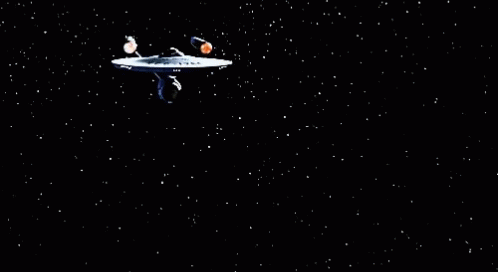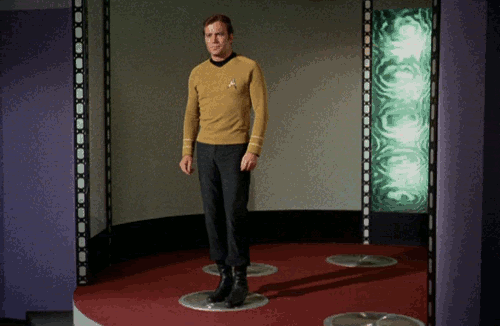Happy Friday War & Peaceniks! Ready for Warp Speed?
Do you remember the first piece of content that ever inspired you?
For me it was Star Trek. Even though I missed the show in its original run (I’m not that old!), I watched it endlessly, after school and late at night, in reruns. I became obsessed. I assembled a model of the USS Enterprise, with meticulous detail, and kept it as a shrine in my childhood bedroom. I’d reenact the episodes in my basement. I had a walkie talkie set made to resemble their communicators. When I eventually got my first iPhone many decades later, my first ringtone was the sound of the ship’s transporter beam.
At the time (it launched in 1966) Star Trek was groundbreaking for the diversity of its main cast. George Takai as Helmsman Sulu. Nichelle Nichols as Chief Communications Officer Uhura. Their inclusion in the show’s core cast was important, but (again in context of the time) the fact that neither fell into the lazy stereotypes of Asians and Black People on screen that were so prevalent back then was even more important.
It’s easy to roll our eyes when comparing today’s push for on-screen diversity to the seemingly hackneyed version Gene Roddenberry gave us in the late 60s, but fact is, the first interracial kiss in the history of television came from Star Trek in 1968. For a white kid from New Jersey, who literally knew no Black People at all, this had an impact. Now imagine young Black and Asian kids around the country who saw someone who actually looked like them on screen, NOT playing racist cartoon tropes, for the first time.
Gene Roddenberry’s concept of Infinite Diversity was just one part of his Utopian vision for the universe he created. During the height of the Cold War, the crew of the Enterprise was on a peaceful mission to make the universe more sustainable for all races. A peaceful mission.
The ship’s First Officer was entirely driven by logic. Science was core to the team’s central mission. Yes, they had battles, but their Prime Directive - in fact the guiding principle of the entire Fleet - was “Non-Interference.”
Imagine introducing that idea to American audiences in the late 60s, on national television, just as the American government was simultaneously and aggressively interfering in countries around the globe and getting embroiled in a proxy war in Viet Nam which destroyed the lives of nearly everyone who lived there, as part of a deadly geopolitical chess match that scarred both nations for a generation. As kids across the country saw their older siblings March into a battle with no point, Star Trek offered a split screen of peace and hope.
Think about how many kids that show inspired. Not just around the concept of diversity and peace, but also towards a vision of invention and ingenuity. Roddenberry and the crew of the Enterprise invented ideas from whole cloth that we now use in everyday life: Tiny smartphone communicators; machine learning; the MRI; GPS navigation; the very first version of Siri; and the first-ever Zoom call!
Google Kobayashi Maru for pop culture’s first AI reference and the monolith it inspired. It is impossible to know how much invention the show subsequently inspired. But here’s a good, long list.
Which brings me to my point.
Look at today’s most popular entertainment. Try and find the inspiration it offers us.
The Last Of Us. Avengers Endgame. Rick and Morty. Infinite True Crime. TikTok. The Media/Entertainment Industrial Complex has become an endless death scroll. Why? Because it sells! Like sugar-coated depressing hotcakes. Even the main character of the most hopeful show on TV, Ted Lasso, is wracked with debilitating anxiety.
The second leading cause of death for American Teens is now suicide. The top cause of death for kids under 18 is now gun violence. While I cannot, and will not try to, prove cause and effect, I have no doubt that the endless unbreakable tension of our popular culture is exacerbating the collective state of anxiety we all share.
Just as importantly, the lack of optimism and hope in our entertainment provides zero inspiration to our youngest generations that we can ever find the “post” to our current apocalypse.
Why invent anything when clearly the zombie takeover is inevitably and utterly unavoidable? The TikTok algorithm says it’s all pointless - over and over and over and over - so what’s the fucking point? In fact, an increasing number of young people on our planet are refusing to have kids, because, why would anyone want to force this shit storm onto anyone else?
We can’t solve the problems we face, if we can’t IMAGINE the solutions - or believe they are even possible. Life changing inventions don’t present themselves like genies when we rub a bottle - we need to be inspired to seek them out. More so than any era in my lifetime, the entertainment we’re now creating offers little hope, and even less inspiration.
We can regulate social media. We can try and control kids’ access to harmful imagery. But the best way to invest in a brighter future, is to inspire one another to actually seek it out - to imagine that it is possible.
We, the entertainment industry - in pure pursuit of profit - are doing just the opposite. Nihilism drives traffic. Hate outsells hope. So we keep greenlighting the apocalypse, and continue cashing checks. Then we wonder how we fell into the contentious, bile-laden dumpster fire we now inhabit.
Stop reading for a minute, and really think about the first piece of content that inspired you. A concert. A painting. A play. An album. A movie. A TV show. A speech. Anything. Then think about the ripple effects that concept had on you. The way it changed your life.
In the early 60s, John Kennedy said to the world “together let us explore the stars.” He promised that “by the end of this decade we will send a man to the moon and bring him safely back to earth.” Let’s be honest: He had no fucking idea how that would happen. He didn’t really even have one, specific tangible reason to do it - other than to inspire his fellow Americans to invent a way to do it (and to beat the Russians there, but that’s off point).
We did, in fact, reach that goal, despite the fact that JFK was dead by the time it happened. On the way, to accomplish that seemingly impossible task, we invented the camera on your iPhone, the cordless drill, the lap top computer, LED lights, running shoes, the dust-buster, water purifiers, the jaws of life, artificial limbs, memory foam and Tang. None of these incredible inventions were the actual intention of the mission itself - but rather byproducts that his mission inspired.
And that’s my point. I write today to implore the entertainment industry to stop producing so much desperation, and start greenlighting much more inspiration. Remember that piece of content that first made you want to create. Add it in the comments below. Let it inspire you anew.
Even if it means risking commercial failure, it’s time to boldly go where we HAVE been before: Offering the kind hope our next generations need to find a better post to today’s apocalypse.
On Monday, May 15, I’ll hold my monthly Media War & Peace Webinar, where I’ll be encoring my presentation from MIPTV. The link and password are below my sign-off. I hope to see you there! Until then…
Enjoy the weekend!
ESHAP
Keep reading with a 7-day free trial
Subscribe to Media War & Peace to keep reading this post and get 7 days of free access to the full post archives.








